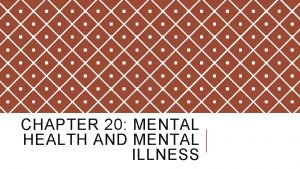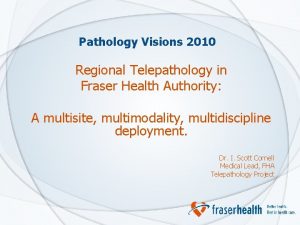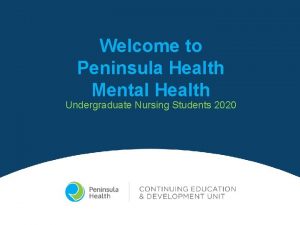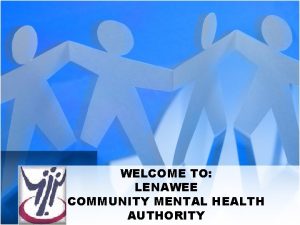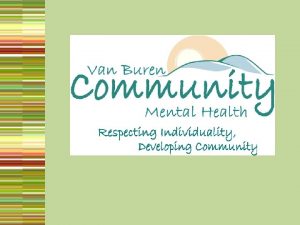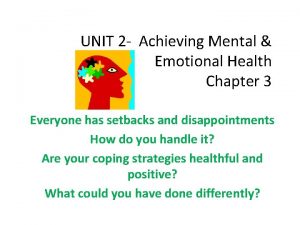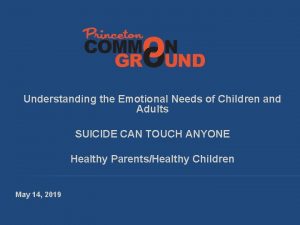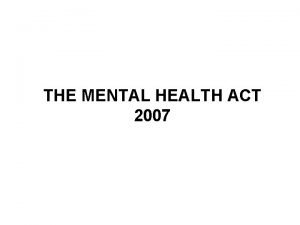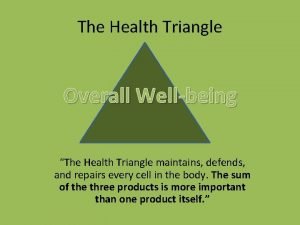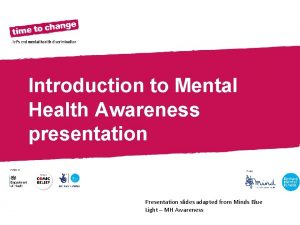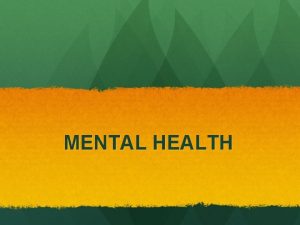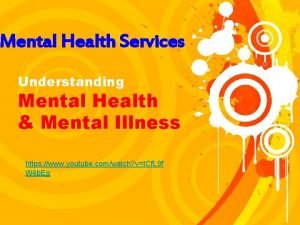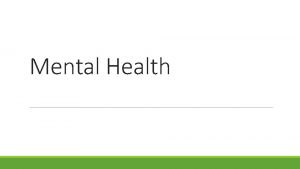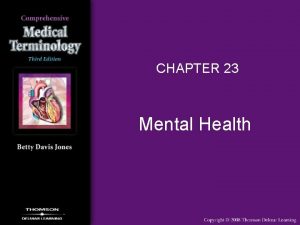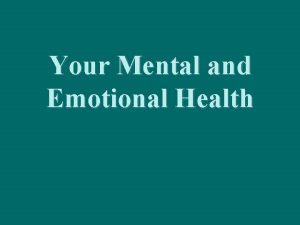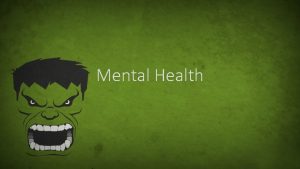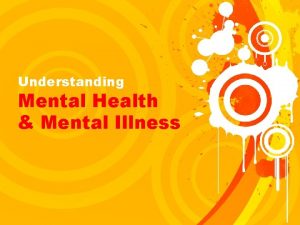Covid 19 Mental Health Covid 19 is changing















- Slides: 15

Covid 19 & Mental Health

Covid 19 is…. Ø changing the way we work Ø socialise Ø travel Ø access healthcare Ø exercise Ø shop

Working Remotely Skype Parties Online Shopping Home Schooling In home entertainment subscriptions Healthcare by phone Online Personal Trainers

Working from Home Ø Ø Working from home can mean you learn to rely on selfmotivation, self-discipline, focus, and concentration. Time management and scheduling become key Ø You can achieve more. As long as you’re not sneaking off, you can actually be more productive when working from home. Ø Time saved by not spending hours commuting Ø Upskilling on communication technology. Skyping, using Zoom, face time, web meetings

Disadvantages can be – Ø Forgetting to clock out. Lack of separation from work life and home life. Ø Feeling out of the loop. Loss of casual collaboration that happens in an office environment. Ø Not having full access to technology platforms. Ø Family responsibilities can easily overlap Ø Feelings of isolation


Ø Ø The Business Case Ø Ø “Wellplace NZ” Ø When thinking about the business case for mental wellbeing, keep these thoughts in mind: Mental wellbeing is one of the most valuable business assets – Like any asset it can be developed, maintained or neglected. Business puts a premium on mental performance – Today’s economy depends in large part on employees’ effective mental and behavioral performance and productivity. Minds do the heavy lifting – In many workplaces, it's our minds and not our bodies that do a business’ heavy lifting. A healthy mind creates solutions better, as it’s more creative and innovative, giving a competitive edge. Both thinking and feeling are involved – Products and services are made by people who need to think, focus, meet deadlines, cooperate, communicate, be empathetic, trustful and be resilient.

Ø . Ø Mental wellbeing affects turnover – Unhappy, dissatisfied or disengaged employees are more likely to take time off, turn up but not be able to work, leave a workplace, and/or suffer injuries. These have massive cost implications (MSW Research, Carnegie Study, 2012). Ø Businesses recognise the obvious risks and effects of cardiovascular disease far more than the less obvious symptoms and impacts of depression. But these two conditions are the main reasons for lost work time through employee disability and early death (NIMH). Ø Managing health and safety risks associated with stress is a legal requirement - See the Employers' legal responsibilities section

Promoting Mental Health in the Work. Place Ø Bring it out in the open. Talk about mental illness. Help dispel the myth that mental illnesses like depression and anxiety are weaknesses and, instead, share the scientific evidence that they are illnesses. Ø Encourage senior managers, influential people and key talent to share stories of their experiences with mental illnesses like depression and anxiety. (The stories don’t have to be a personal account of suffering from mental ill health but could be about supporting a loved one or friend who hasn’t been well. ) Storytelling is a very powerful means of normalising these illnesses and making it okay to ask for help. Ø Promote campaigns that inspire employees to maintain and enhance their mental health. Ø Encourage exercise and other activities that support mental well-being like yoga, mindfulness and meditation. Share apps like Headspace or Calm that employees can use to maintain their own mental wellbeing. Ø Signpost resources on your intranet where employees can access help with mental health issues like depression or anxiety so they can more easily find the support they need. Ø Create an environment where individuals feel their work is meaningful and humane. “Your organisation’s culture and purpose are core to people’s wellbeing, ” Geoff Mc. Donald.

Centers for Disease Control and Prevention (CDC), What stress during an infectious disease outbreak can look like: Ø Fear and worry about your own health and the health of your loved ones Ø Changes in sleeping or eating habits Ø Difficulty sleeping or concentrating Ø Worsening of chronic health problems Ø Increased use of alcohol, tobacco, or other drugs

Strategies from the CDC to help manage anxiety during Covid 19: Ø Take breaks from watching, reading, or listening to news stories, including on social media. Hearing about the pandemic over and over can be upsetting. Ø Take care of your body. Take deep breaths, stretch, or meditate. Ø Eat healthy, well-balanced meals. Ø Exercise regularly. For older adults, the CDC recommends aiming for 150 minutes a week of moderate intensity activity such as brisk walking. Do walk outside on nice days but avoid crowded places and make sure to maintain a 2 meter distance between you and others. Wash your hands when you get home. Ø Get plenty of sleep….

Ø Relax by doing activities you enjoy. Try crossword or jigsaw puzzles, get outside and garden if you can, cook healthy meals and freeze some for later, and seek out TV shows to watch that give you pleasure. Explore your library’s online offerings. Ø Connect with others. You may not be able to socialize in person for a while, but many older adults are turning to video chat options such as Face. Time visits on their smartphone, Skype calls, and Zoom calls. These virtual visits are the next best thing to spending time in person with friends and family. Ø Find virtual support. If you already have issues with your mental health or substance use, you may find it even harder to cope right now. Many in-person groups are holding online meetings to provide each other with mutual support:

Apps, e-therapy & guided self-help https: //www. mentalhealth. or g. nz/get-help/a-z/apps-etherapy-and-guided-selfhelp/ q https: //www. justathought. co. nz/ q https: //www. mentemia. com/ business q https: //www. workwell. health. nz/workplace_wellbeing q This Photo by Unknown Author is licensed under CC BY-NC

Finding Balance

This Photo by Unknown Author is licensed under CC BY-NC-ND
 Chapter 20 mental health and mental illness
Chapter 20 mental health and mental illness Mental health jeopardy questions and answers
Mental health jeopardy questions and answers C.d.c. covid isolation health workers
C.d.c. covid isolation health workers Covid isolation health workers
Covid isolation health workers C.d.c. covid isolation health workers
C.d.c. covid isolation health workers Covid isolation health workers
Covid isolation health workers Bc health region map
Bc health region map Qld health covid
Qld health covid Met call vs code blue
Met call vs code blue Lenawee county cmh
Lenawee county cmh Van buren county cmh
Van buren county cmh Chapter 3 lesson 3 expressing emotions in healthful ways
Chapter 3 lesson 3 expressing emotions in healthful ways Together for mental health
Together for mental health Mental health act 2007 summary
Mental health act 2007 summary Emotional health examples
Emotional health examples Titles for mental health presentations
Titles for mental health presentations
